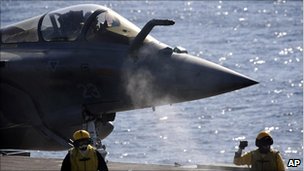 An international summit on Libya is under way in Qatar, with delegates hearing there is a "race against time" to help Libyan civilians.
An international summit on Libya is under way in Qatar, with delegates hearing there is a "race against time" to help Libyan civilians.
Qatar's crown prince said that every day that passed meant more victims.
Rebels seeking to topple Col Gaddafi are making their first high-profile diplomatic appearance and will meet the newly formed "contact group" on Libya.
Giving the rebels military, political and financial support will all be discussed, as will Nato's role.
Ahead of the meeting, the French and British foreign ministers said Nato should be doing more in Libya.
'Tarnished image'
The "contact group" was formed at an international ministerial conference in London on 29 March and includes European powers, the US, allies from the Middle East and a number of international organisations.
Opening the summit, Crown Prince of Qatar Sheikh Tamim bin Hamad bin Khalifa al-Thani said that Libya was facing a humanitarian crisis.
He said: "The suffering of the Libyan people is not a natural disaster - it is the outcome of political decisions and political behaviour."
The crown prince said that by blaming extremists for the crisis, the Libyan government was "tarnishing the image of their people so they can remain in power".
"The Libyan people are not begging - they are a great people with great resources but they have been prevented from exercising their rights and developing their resources."
UN Secretary General Ban Ki-moon told the summit that up to 3.6 million people may eventually require humanitarian aid, more than half of the country's population.
UK Foreign Secretary William Hague said there were three main aims for the summit:
Maintain the pressure on the Gaddafi regime by implementing the UN resolutions and sanctions, and ensuring that Col Gaddafi leaves power
Discussing the stabilisation plan for peace building in Libya
Endorsing a political process leading to a democratic Libya, including the establishment of a temporary financial mechanism to help the opposition-controlled areas of Libya
Mr Ban urged nations to speak with "one voice", but divisions were apparent ahead of the Qatar talks.
Britain and France, which have been carrying out most of the air strikes, want greater military effort from other coalition members.
Italian officials also suggested that arming the rebels would be discussed.
However, Germany said it saw no military solution to the Libyan crisis.
And Belgian Foreign Minister Steven Vanackere said: "The UN resolution speaks about protecting civilians, not arming them."
Germany also said a proposal to fund the opposition from frozen Gaddafi assets could present legal problems.
Koussa's attendance
Correspondents say it will also be difficult to get agreement on a firm call for Col Gaddafi's departure.
At the London conference, it was said only that he had lost legitimacy.
Mr Hague said on Wednesday: "Any viable ceasefire, any viable peaceful future for Libya must involve the departure of Col Gaddafi so such statements may be clearer as a result of our conference."
He said Col Gaddafi's government was "internationally isolated", adding: "It has no future under some of the most sweeping sanctions that the United Nations has ever adopted and so the writing is on the wall for the Gaddafi regime."
However, a spokesman for the African Union, which has been trying to broker a ceasefire, said there was no agreement on regime change.
Noureddine Mezni said: "We cannot as international or regional organisations say, 'go'."
Earlier this week the rebels' Transitional National Council (TNC) rejected the African Union proposal for a ceasefire, because it did not provide for Col Gaddafi's immediate departure.
The TNC, which attended on the sidelines of the London conference, has been invited to address the meeting in Qatar as it continues its campaign to gain international recognition as the voice of the Libyan people.
Among those also due to attend the talks will be former Libyan foreign minister Moussa Koussa, who fled to the UK late last month.
He is expected to meet the Qatari government on the sidelines of the talks and offer "insights" on the current situation in Libya, according to British officials.
Mr Koussa is a former head of Libyan intelligence and has been accused of being involved in the 1988 Lockerbie bombing.
A spokesman from the UK government said that Mr Koussa was "a free individual, who can travel to and from the UK as he wishes".
A Transitional National Council spokesman, Mustafa Gheriani, told Agence France-Presse that Mr Koussa was not connected to it "in any way or shape".



